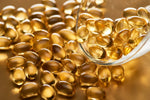
What is the Best Form of Omega-3 to Take: A Comprehensive Guide
, by Sandesh Prasannakumar, 8 min reading time
Stay tuned, Your Favourite supplements will be back in stock soon!
Stay tuned, Your Favourite supplements will be back in stock soon!
Stay tuned, Your Favourite supplements will be back in stock soon!
Stay tuned, Your Favourite supplements will be back in stock soon!
Stay tuned, Your Favourite supplements will be back in stock soon!
Stay tuned, Your Favourite supplements will be back in stock soon!
Stay tuned, Your Favourite supplements will be back in stock soon!
Stay tuned, Your Favourite supplements will be back in stock soon!
Stay tuned, Your Favourite supplements will be back in stock soon!
Stay tuned, Your Favourite supplements will be back in stock soon!

, by Sandesh Prasannakumar, 8 min reading time
Omega-3 fatty acids are also known as polyunsaturated fatty acids and are very important nutrients in the body. These are fats that are considered to be healthy due to their capability to reduce inflammation, improving heart health and even brain health. Nevertheless, Omega-3 supplements come in different forms, including omega-3 tablets, fish oil, krill oil, and algae oil; this makes it quite a challenge to determine the best one to take. In this definitive guide, we will discuss the various types of omega-3s and their impact and guide you on which type of omega-3 supplement is most suitable for you.
Omega-3 fatty acids are unsaturated fats that are needed in the human body for good health. There are three primary types of omega-3 fatty acids:
Of all the omega-3 fatty acids, EPA and DHA are the most important for health and can be taken from seafood or supplements.
Fish oil is one of the most popular and widely used omega-3 supplements. It is derived from the tissues of oily fish and contains both EPA and DHA. Fish oil is available in various forms, including liquid, soft gels, and omega-3 tablets. It is known for its high concentration of omega-3 fatty acids and has been extensively studied for its health benefits.
Benefits of Fish Oil:
Krill oil is another marine-derived omega-3 supplement that is gaining popularity. It is extracted from tiny shrimp-like crustaceans called krill. Krill oil contains EPA and DHA but in a phospholipid form, which may enhance its absorption compared to fish oil.
Benefits of Krill Oil:
Algae oil is a plant-based omega-3 supplement that is particularly suitable for vegetarians and vegans. It is derived from microalgae and is rich in DHA, with some algae oils also containing EPA.
Benefits of Algae Oil:
Omega-3 tablets are a convenient and easy way to incorporate omega-3 fatty acids into your daily routine. These tablets are often made from fish oil, krill oil, or algae oil and come in various dosages to meet individual needs.
Benefits of Omega-3 Tablets:
When choosing the best form of omega-3 to take, consider the following factors:
Depending on the state of an individual’s health, the recommended dosage of omega-3 differs. Based on the American Heart Association, the daily intake of EPA and DHA should be at least 500 mg and consumption of at least 2 servings of fatty fish per week is suggested for general health. As for the supplements, the intake of EPA and DHA is recommended to be between 250 and 1000 mg per day.
While omega-3 supplements are generally safe for most people, some individuals may experience side effects such as:
To avoid potential complications, one should take a small amount of it and gradually increase the dosage. Another way of avoiding this is by taking enteric-coated omega three tablets, which are also available in the market, in order to minimize the fishy smell.
Omega 3 tablets are easy to take and can be easily incorporated into one’s diet. Here are some tips:
Omega-3 fatty acids are crucial to the body in many ways, and it is advisable to take supplements to boost their intake. When it comes to fish oil, krill oil, algae oil or omega-3 tablets, you must be taking a high-quality product that is right for you. Omega-3 tablets, for instance, are an easy and accurate method of getting your required daily intake of these important fats. From the above discussion of the various types of omega-3s, the source of omega-3, the bioavailability of the supplement, and the degree of purity, the consumer can easily determine the best supplement for them to take to reap the maximum health benefits.
Hence, if you are interested in improving your heart health, enhancing brain function, or decreasing inflammation, then omega-3 tablets can be a great supplement to incorporate into your health regimen. It is always recommended to seek advice from a health care provider before introducing any new supplement in the body, especially if one has other medical conditions or is on the use of other medication. Thus, with the right omega-3 supplement, one can put his/her money where the health is and improve the quality of life in the process.